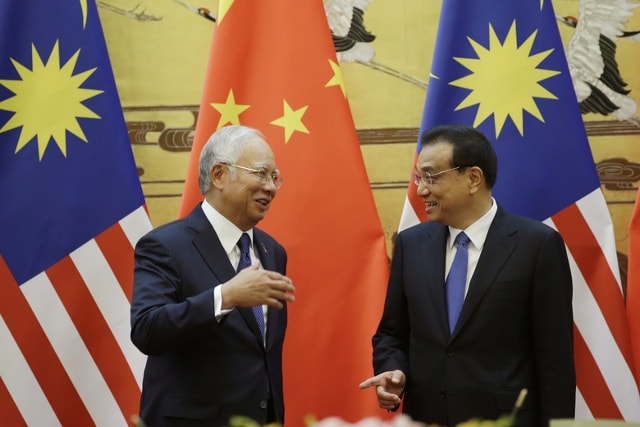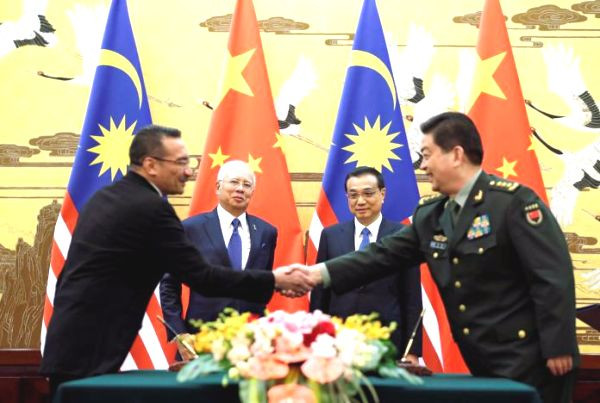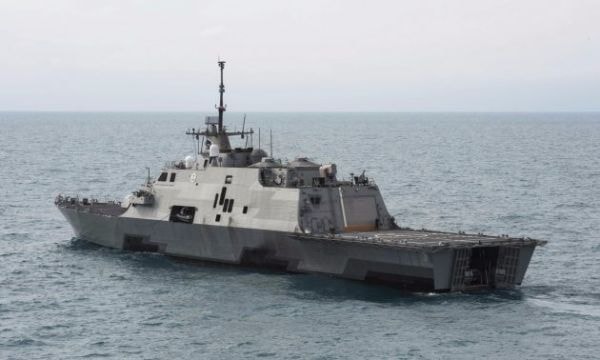Malaysian Prime Minister visits China: Not just to discuss business
(Baonghean) - Malaysia-China relations have “reached new heights” after a series of important agreements during Prime Minister Najib Razak’s visit to China. The visit attracted special media attention because it took place after the Philippine President’s visit to China after the July 12 Arbitration Award. Is there a shift in Malaysia’s foreign policy?
Unexpected contracts
Just like the Philippine President visited China a few weeks ago, the Malaysian Prime Minister led a large group of businessmen to Beijing for a six-day visit from October 30. This shows that the economy is one of the focuses of the Malaysian Prime Minister's visit this time.
As expected, Prime Minister Najib “brought home” a series of large economic agreements worth tens of billions of dollars. He said that Malaysia and China had achieved “historic achievements” in economic relations when signing 14 agreements with a total value of 34.4 billion dollars, including a railway agreement worth up to 13 billion dollars.
“This is the biggest deal Malaysia has ever signed with China,” Malaysian Transport Minister Liow Tiong Lai stressed, adding that he is optimistic that the project will help reduce costs and time for transporting goods in Malaysia.
 |
| Malaysian Prime Minister Najib Razak (left) meets with Chinese Premier Li Keqiang at the Great Hall of the People in Beijing on November 1. Photo: AP. |
However, the most notable contract signed between the two leaders was in the field of defense. Accordingly, Malaysia agreed to buy four naval ships from China and committed to Beijing to bilaterally resolve disputes in the East Sea. The naval ships that Malaysia bought from China are littoral combat ships. Two of these will be built in China and the other two will be built in Malaysia. The purchase of four naval ships from China marks the first major defense deal between Kuala Lumpur and Beijing, and is considered to have great symbolic significance.
This move took place in the context of tensions in the East Sea taking a new turn after the ruling of the Permanent Court of Arbitration in The Hague (Netherlands) in mid-July, which declared the rejection of the nine-dash line unilaterally drawn by China in the East Sea.
Both Malaysia and the Philippines are parties to disputes in the South China Sea with China. However, Kuala Lumpur has long adopted a policy of avoiding confrontation because it does not want to displease Beijing, as China is a major economic partner. Clearly, Malaysia’s defense cooperation with Beijing seems to have created a “new chapter” in the relationship between the two countries.
During this visit, Prime Minister Najib also called himself a “true friend of China”, and the bilateral relationship had “reached a new height”.
Malaysia shifts foreign policy priorities?
With these developments, many analysts have questioned whether Mr. Najib’s visit to China this time is a sign that Malaysia is likely to change its strategic direction, “getting closer” to China and “turning its back” on the US like the Philippines did. Because in fact, in addition to economic benefits, Malaysia has begun to turn to defense cooperation with China - a move that is considered surprising in the context of complicated regional disputes.
 |
| Malaysian Prime Minister Najib Razak witnessed the signing ceremony of an agreement to buy four naval ships from China. Photo: Reuters |
In fact, since taking office in 2009, Prime Minister Najib has worked to strengthen ties with the US, and the relationship between the two sides has become warmer after decades of mutual distrust. In April 2014, during President Barack Obama’s visit to Malaysia, the two sides agreed to upgrade their relationship to the level of a “comprehensive strategic partnership”.
Prime Minister Najib also had a close personal relationship with President Obama. The two leaders spent a day playing golf in Hawaii in 2014. However, the relationship between the two countries became tense last July after the US Justice Department opened an investigation into alleged money laundering at a state investment fund linked to the Malaysian leader. Following this scandal, the flow of investment capital from the US to Malaysia has continuously decreased.
Meanwhile, China has continued to “open its wallet” for Malaysia. Since 2009, China has always held the position of Malaysia’s largest investor in the region.
In addition, Chinese leaders also have special feelings for Prime Minister Najib. In 2014, when Prime Minister Najib paid a week-long visit to China, President Xi Jinping personally invited Najib to a friendly dinner. The gesture of the Chinese head of state was called a “special meal” by the media and moved the Malaysian leader.
At that time, in Beijing, Mr. Najib praised the relationship between Beijing and Kuala Lumpur as “not just a government-to-government relationship but also a friendly family relationship.” This time, also to express that “friendship,” China also sent an invitation to the Malaysian Prime Minister’s family to join him on a trip to Beijing.
 |
| Malaysia has agreed to buy four naval ships from China. Photo: Reuters |
Experts say the Malaysian government is in dire need of attracting Chinese investment, especially in the fields of new technology and infrastructure. According to Dr. Mustafa Izzuddin, an expert at the Institute of Southeast Asian Studies in Singapore, Prime Minister Najib wants to boost growth for the Malaysian economy in 2017 to create more trust and prestige for his leadership role, thereby strengthening the ability to win the ruling coalition in the 2018 National Assembly election.
In short, Malaysia needs cash for its economy, and China is willing to open its wallet. Of course, the friendly relationship for economic benefits also partly “eases” the tensions in the East Sea dispute between China and Malaysia.
So far, it is difficult to predict the shift in Malaysia’s foreign policy. But one thing is certain, Prime Minister Najib is also seeking Malaysia’s balance among the superpowers and this reality will significantly impact the regional geopolitical picture.
Thanh Huyen
| RELATED NEWS |
|---|
